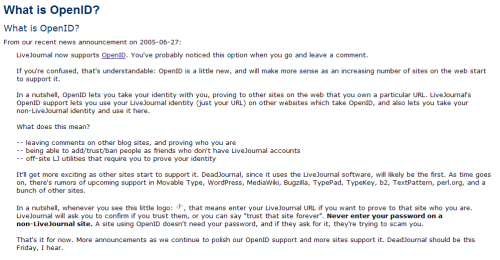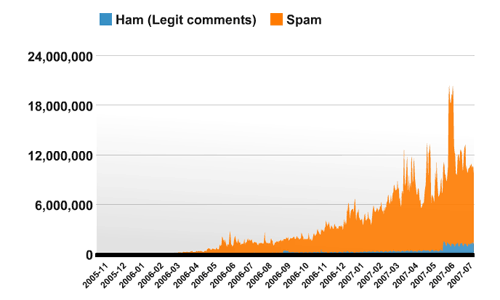The reason tigers jump through hoops is because their handlers have whips.
From time to time, I’ve harped on Morte’s blog, specifically the requirement that any commenter must have a TypeKey account. I have accounts on several web forums, my ISP account, my bank account, my Gravatar, my admin accounts for my personal gallery, my kid’s website, my kid’s website’s gallery, my sister’s website, my wiki, my office wiki, my office admin server, the ordering system for DSL circuits, the ticket system for DSL trouble reports, the list goes on and on. Do I want to sign up for Typekey to tell an old buddy that he’s on crack for reviewing a book he hasn’t read? No, not really.
Enter OpenID. What a lovely idea, a distributed identification system. I was going to reply to a comment on Wolfgang Baur’s livejournal and noticed that I needed to post anonymously, get a Livejournal account, or get an OpenID instead. The first option doesn’t really appeal to me, as I understand that the Internet isn’t really anonymous, so my comments may as well be associated with my online persona. The second option is basically the same as having to sign up for Typekey. Maybe it’ll let me commend on a couple of other Livejournal pages as well, but frankly that just doesn’t come up very often for me.
The OpenID option immediately struck me as a good idea, so I followed the “What is OpenID” link on Mr. Baur’s page. To be honest, I didn’t really want to know what OpenID was. I’d heard of the concept before, what I really wanted was an ID in that system, one that I could theoretically re-use in a variety of contexts and thus achieve some measure of efficiency in presenting myself on other people’s sites. What missing below?
That’s right, no “get an ID” option. Well, there’s a link to the OpenID site itself. Let’s give that a try.
This page is positively fertile with links. I count eight links in the main body of this page, and ten in the sidebar (not counting the Web100 image). The body links helpfully
- tell me what a URI is and what “authentication” means (color me insulted)
- refer me to the specifications for their authentication scheme
- links me to the definition of “strong authentication” because putting an obscure technical term like “strong” in front of the previously-defined “authentication” is bound to lead to confusion
- links me to the specifications
- refers me to some kind of bounty system meant to encourage adoption of the OpenID system
- links me to a Mailman mailing list
- refers to something to do with medieval identification systems.
Whew. Having skimmed through looking for something like “sign me up” or “get an ID” or “register” or “log in” or “I want to be a part of this thing you’ve got here,” I’m utterly disappointed. The presence of links to definitions of basic Intarweb terminology indicates that the authors of this page assume I’m an idiot, yet the functionality of the site doesn’t accommodate this assumption.
Apparently I’m expected to read through the “How it works” documentation on the OpenID site (something the referring page at Livejournal has thoroughly discouraged me from doing), install something on my own webpage, and then things will magically work themselves out. In short, it was tl;dr, I remain uninvolved in the OpenID system, and Mr. Baur is short a comment on his site. What about instant gratification don’t these folks get? Give me a shiny button that calls upon me to participate, then give me instructions. If I want to know how the nuts and bolts of it work, I’d appreciate an informative link or two, but don’t give me a pile of homework just so I may have the privilege of posting a possibly-witty retort to some dude’s online ramblings. It’s a barrier to entry, an unnecessary hurdle.
In the interest of practicing what I preach, the comment mechanisms of this site are intentionally minimal. The IP banning, Hashcash, and Akismet antispam systems are all transparent to the commenter, and the requested screen name, email address, and URL are more-or-less standard fare. Very little spam leaks through my filters, though attempts at comment spam massively outweigh the number of actual comments.
Humble suggestions:
- If you want visitors to comment on your site, let them
- If you want people to participate in your swizzy social networking mechanisms, guide people towards participation. You may notice that successful sites like Youtube, Flickr, and Myspace all have very clear mechanisms for letting newcomers join in on the fun.
- If you don’t want people to comment or participate, force them to wade through arcane procedures. This is why the clocks on VCRs were almost always flashing “12:00” and why most DVD players and such don’t even have clocks on the face anymore.




